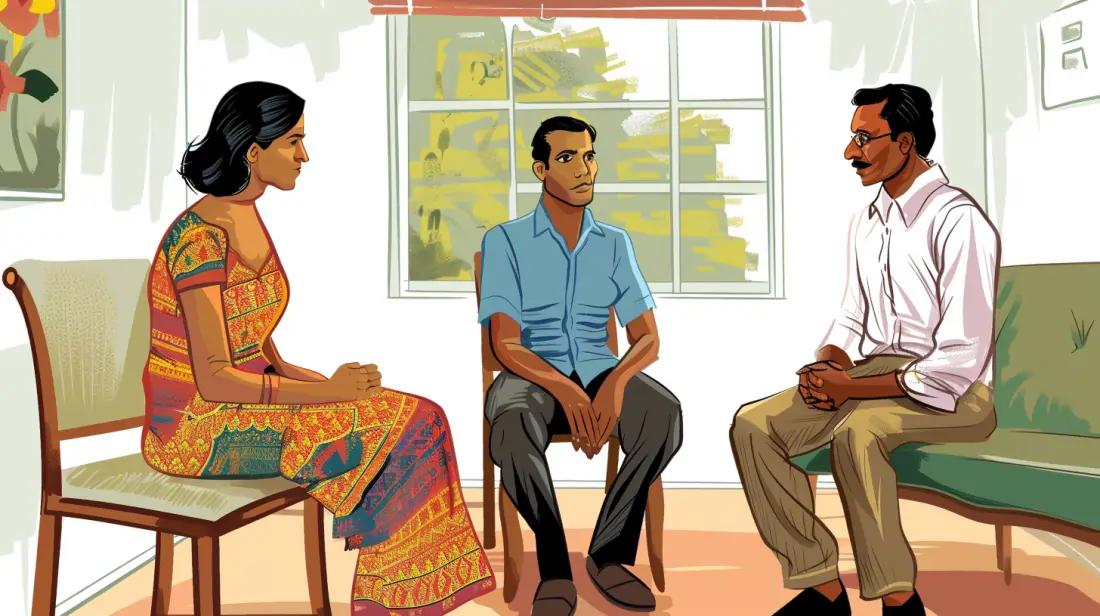Understanding and Overcoming Marriage Failures in Sri Lanka: Real-Life Examples and Practical Solutions
Understanding and Overcoming Marriage Failures in Sri Lanka: Real-Life Examples and Practical Solutions
Marriage in Sri Lanka faces challenges like cultural expectations, evolving gender roles, and financial pressures. Solutions include open communication, equality, joint financial management, and realistic expectations. Adapting traditions and professional counseling can further support resilient, fulfilling relationships.
Marraige Failures
Sri Lanka
Tips

Marriage is a central pillar of Sri Lankan society, deeply rooted in cultural traditions and family values. However, like anywhere else, Sri Lankan marriages face their share of challenges that can lead to dissatisfaction and even failure. By exploring these challenges and providing practical solutions, we can offer valuable insights for couples seeking to strengthen their relationships. Let’s delve into common factors behind marriage failures in Sri Lanka, enriched with real-life examples and engaging solutions.

1. Cultural Expectations and Pressures in Sri Lankan Marriages
Challenge:
Cultural norms and societal expectations can create immense pressure on couples, especially in arranged marriages where partners might not have had extensive prior interactions.
Example:
Consider the case of Amali and Rumesh. Their arranged marriage started off with high
hopes, but Anita’s desire to build a successful career clashed with Rumesh’s family
expectations for her to focus on home-making. Amali found herself juggling her
professional responsibilities with the traditional expectations placed upon her, leading
to constant stress and frustration.
Solution:
- Foster Open Communication: Amali and Rumesh initiated weekly discussions about their roles and expectations. They discovered common ground by agreeing on a balance that allowed Amali to pursue her career while fulfilling key household responsibilities.
- Adapt Traditions: They respectfully modified certain cultural practices to fit their modern lifestyle. For example, they decided to share domestic duties more equitably, blending traditional values with contemporary realities.
- Seek Premarital Counseling: Engaging in premarital counseling helped them address potential issues before they became major problems, fostering a stronger mutual understanding.
Keywords: cultural expectations in Sri Lankan marriages, arranged marriage challenges, premarital counseling Sri Lanka
2. Evolving Gender Roles and Marital Conflict
Challenge:
The evolving role of women in society can create friction when traditional gender roles are challenged.
Example:
Lihini and Rajitha’s marriage encountered difficulties when Lihini returned to work after
having their first child. Rajitha, who had been accustomed to traditional gender roles,
found it hard to adjust to a more balanced division of labor at home. This created tension
and disagreements over household responsibilities.
Solution:
- Encourage Equality: Lihini and Rajitha held candid conversations about their expectations regarding domestic roles. They created a schedule that allowed Rajitha to take on more responsibilities at home, which eased the burden on Lihini.
- Support Career Goals: Rajitha actively supported Lihini’s career ambitions, which strengthened their partnership. They made sure to encourage each other’s professional growth while maintaining a healthy work-life balance.
- Promote Open Dialogue: Regular check-ins helped them reassess their roles and responsibilities, ensuring that both partners felt valued and respected.
Keywords: evolving gender roles Sri Lanka, gender role conflicts in marriage, gender role discussions

3. Managing Economic Pressures in Marriage
Challenge:
Financial stress often leads to conflicts over budgeting and spending, especially when unexpected financial strains occur.
Example:
Kalpa and Priyani faced a tough time when Kalpa lost his job. With mounting bills and
reduced income, the couple began to argue over how to manage their finances. Their
differing views on budgeting only added to their stress and led to frequent disputes.
Solution:
- Create a Joint Budget: Kalpa and Priyani sat down together to develop a comprehensive budget that addressed their immediate needs and future goals. This transparency helped reduce financial stress and prevent disagreements.
- Set Financial Goals: They established short-term goals like saving for emergencies and long-term goals such as paying off debt. Working towards these goals together helped them stay focused and united.
- Seek Financial Counseling: They sought advice from a financial counselor, who provided strategies to manage their finances effectively and alleviate some of the pressure.
Keywords: economic pressures in marriage Sri Lanka, managing finances in marriage, financial counseling Sri Lanka

4. Improving Communication in Sri Lankan Marriages
Challenge:
Cultural norms may inhibit open communication, leading to misunderstandings and unresolved issues.
Example:
Nayomi and Sajeewa, like many couples, avoided discussing their feelings openly due to
cultural norms emphasizing respect and deference. This led to unspoken grievances and
mounting frustration between them.
Solution:
- Encourage Honest Conversations: Nayomi and Sajeewa established a weekly “talk time” where they could openly share their thoughts and feelings. This regular practice helped them address issues before they escalated.
- Use Conflict Resolution Techniques: They learned and applied techniques such as active listening and empathy to handle disagreements constructively. This approach helped them understand each other’s perspectives better.
- Seek Professional Help: When communication challenges persisted, they attended couples counseling to develop more effective communication skills and resolve underlying issues.
Keywords: improving communication in marriage, conflict resolution techniques, couples counseling Sri Lanka
5. Addressing Unrealistic Expectations in Marriage
Challenge:
Unrealistic expectations of constant romance and happiness can lead to disappointment when everyday challenges arise.
Example:
Ravi and Mihiri entered their marriage with high expectations of constant joy and
excitement. When daily routines and responsibilities took over, they struggled with
feelings of disillusionment and dissatisfaction.
Solution:
- Set Realistic Goals: Ravi and Mihiri acknowledged that marriage involves both joys and challenges. They focused on setting realistic goals and building a solid foundation to handle ups and downs.
- Focus on Strengths: They made a concerted effort to celebrate each other’s achievements and strengths, fostering a positive and supportive environment.
- Engage in Continuous Learning: Ravi and Mihiri attended relationship workshops and read books on maintaining a healthy marriage, which provided them with new tools and perspectives to enrich their relationship.
Keywords: unrealistic expectations in marriage, relationship workshops, maintaining a healthy marriage

6. Managing Extended Family Influence
Challenge:
Extended family involvement can create stress and conflicts, especially when family
members interfere in marital decisions.
Example:
Lihini and Dinesh faced significant stress when Lihini’s mother frequently intervened in
their marital matters. This led to conflicts and strained their relationship with both
each other and Lihini’s family.
Solution:
- Establish Boundaries: Lihini and Dinesh had a straightforward conversation with Lihini’s mother, setting clear boundaries regarding family involvement. They agreed on maintaining a balance between family support and marital autonomy.
- Prioritize the Marriage: They made joint decisions and supported each other in managing external pressures. This approach helped them strengthen their partnership and handle family dynamics more effectively.
- Seek Mediation: When conflicts became overwhelming, they sought mediation from a trusted family friend to help resolve issues and restore harmony.
Keywords: extended family influence Sri Lanka, managing family interference, marital mediation
7. Navigating Personal Differences and Compatibility Issues
Challenge:
Personal differences and compatibility issues can lead to conflicts, especially when values and life goals differ significantly.
Example:
Amila and Shalini had differing views on having children. Amila wanted a large family,
while Shalini preferred to remain childless. This fundamental difference led to frequent
arguments and feelings of frustration.
Solution:
- Embrace Compromise: Amila and Shalini engaged in open discussions to understand each other’s perspectives. They explored potential compromises, such as adopting or delaying the decision on having children, to find a mutually acceptable solution.
- Cultivate Mutual Respect: They focused on respecting each other’s values and preferences while finding common ground. This approach helped them navigate their differences with greater empathy and understanding.
- Engage in Joint Activities: By participating in shared activities, such as traveling or volunteering, Amila and Shalini strengthened their bond and gained a deeper appreciation for each other’s values.
Keywords: personal differences in marriage, managing compatibility issues, embracing compromise
Conclusion
Marriage in Sri Lanka is a deeply valued institution, but it comes with its own set of challenges. By understanding and addressing issues such as cultural expectations, evolving gender roles, financial pressures, communication barriers, unrealistic expectations, extended family influence, and personal differences, couples can work towards building stronger, more resilient relationships. Implementing practical solutions and leveraging available resources can help Sri Lankan couples navigate the complexities of marriage, fostering lasting and fulfilling partnerships.
Keywords: marriage challenges Sri Lanka, overcoming marital issues, building resilient relationships